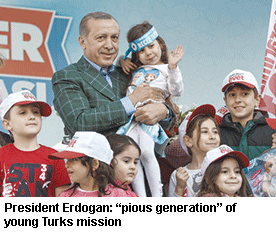Turkey: Education Islamisation spree
 Days before the start of the new school year, Merve, a class VIII science teacher, is flipping through the pages of her old biology textbook. A picture of a giraffe appears, alongside a few lines about Charles Darwin. Teaching evolution in a predominantly Muslim country where six out of ten people refer to themselves as creationists, according to a 2010 study, has never been easy. And today, it’s no longer possible. A new curriculum has scrapped all references to Darwin and evolution.
Days before the start of the new school year, Merve, a class VIII science teacher, is flipping through the pages of her old biology textbook. A picture of a giraffe appears, alongside a few lines about Charles Darwin. Teaching evolution in a predominantly Muslim country where six out of ten people refer to themselves as creationists, according to a 2010 study, has never been easy. And today, it’s no longer possible. A new curriculum has scrapped all references to Darwin and evolution.
Turkey’s president, Recep Tayyip Erdogan, has made clear on more than one occasion that he would like to bring up a “pious generation” of young Turks. He has made plenty of headway. The education ministry, says Feray Aytekin Aydogan, the head of a leftist teachers’ union, is working more closely than ever with Islamic NGOs and with the directorate of religious affairs. Attendance at so-called imam hatip schools, used to train Muslim preachers, has shot up from about 60,000 in 2002 to over 1.1 million, or about a tenth of all public-school students. The government recently reduced the minimum population requirement for areas where such schools are allowed to open from 50,000 to 5,000. An earlier reform lowered the age at which children can enter them from 14 to ten.
The new curriculum has left Turkish liberals and secularists aghast. From this year onwards, children as young as six will be taught the story of last summer’s abortive coup — presumably without including the mass purges and arrests that followed it. Imam hatip students, meanwhile, will study the concept of jihad. (The education ministry says the term, which can also refer to one’s personal struggle against sin, has been misused.) A module on the life of Prophet Muhammad will teach the same pupils that Muslims should avoid marrying atheists, and that wives should obey their husbands. Schools are also becoming a target of Erdogan’s mosque-building spree. A new rule requires all new schools to be equipped with prayer rooms, segregated by sex. “The interference of religion into education has never been as visible and as deep,” says Batuhan Aydagul of the Education Reform Initiative, a think-tank in Istanbul.
During its first decade in power, President Erdogan’s ruling Justice and Development (AK) party indeed presided over vast improvements in the country’s education. As the economy boomed, millions of Turks lifted themselves out of poverty. Many more young Turks, especially girls, started going to school. Spending increased, and thousands of new schools opened. Yet progress has stalled since then. Student performance, as measured every three years by the Programme for International Student Assessment (PISA), having improved until 2012, dipped in 2015. Turkish students scored second to last among all OECD countries that year. The previous curriculum placed a bigger emphasis on critical thinking. The new one has reverted to an emphasis on rote learning.
Many now resort to private schools. Devrim Ertekin, a drug company employee, recently enrolled his six-year-old son in a private preschool in Istanbul, though the fees are a big drain on his income. “We no longer trust the public school system,” he says. The feeling appears to be widely shared. The share of Turkish high-schoolers in private education has swelled from 7 percent in 2011 to 20 percent last year.
Turkish public schools may indeed under-perform, but in Erdogan’s eyes only they can be trusted to raise genuine patriots. Students sent to the West for education, he said on September 25, “return as the West’s volunteer spies”. He might care to recall, however, that all four of his children studied abroad.
(Excerpted and adapted from The Economist and Times Higher Education)














Add comment